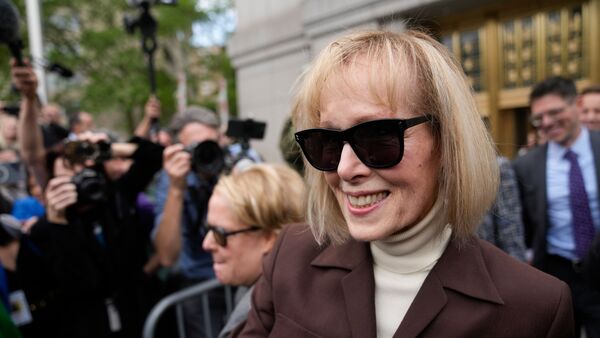“Does anybody believe that I would take a then almost 60-year-old woman that I didn’t know [into a department-store dressing room] and…her,” Donald Trump asked his followers on Truth Social, a social-media platform, on April 26th. On May 9th a New York jury said that, actually, yes they mostly did.
In a civil case E. Jean Carroll, a writer, accused Mr Trump of raping her in a Manhattan department store over 25 years ago. A federal jury unanimously found it was more likely than not (the evidentiary standard for a civil trial) that Mr Trump sexually abused her and later defamed her when denying her allegations. For this, they said that Mr Trump must pay Ms Carroll $5m. The jury did not go as far as agreeing that the assault constituted rape.
Although Mr Trump will no doubt try to spin that last finding to his advantage, this was a dire day for the former president. Among the dozens of accusations and legal troubles he has faced since he ran for office, this ruling is the first major legal judgement against him. That is significant. Whereas previously he could wave away accusations such as Ms Carroll’s by claiming his accusers were politically motivated “wack jobs”, now nine ordinary citizens—six men and three women—have firmly concluded that he did something wrong and has to pay for it.
Other victims of sexual assault may now take confidence from Ms Carroll’s success in court, and decide to do the same. In New York they have until November to bring historical accusations of sexual assault, under a special “lookback window” law. As for Ms Carroll, she has said all along that most of all she wanted to clear her name, which this case resoundingly did.
Historical claims of sexual abuse are notoriously hard to prove in court. But as the case progressed over the past week the belief that Mr Trump might lose steadily grew. The contrast between camp Carroll and camp Trump was stark. Ms Carroll’s testimony was emotional, composed and credible, and her lawyers methodically layered on witness after witness to back up her claims and make the case that Mr Trump’s behaviour was part of a broader pattern. They replayed the infamous “Access Hollywood” tape, in which Mr Trump brags about grabbing women by the genitals. To spell it out, they presented the jury with a chart with pictures of the three women who testified that Mr Trump had assaulted them, with checkmarks next to the columns “semi-public place”, “grab suddenly” and “not my type”.
Camp Trump on the other hand offered no witnesses. Mr Trump did not avail himself of his right to come to court and testify. For his lawyers that was probably a relief; their client had shown in a previously filmed deposition, parts of which were played during the trial, just how loose a cannon he can be—even telling Ms Carroll’s lawyer that she was not his type either. The only thing the jury heard on behalf of the accused, besides the damning clips shown by Ms Carroll’s lawyers, was the attack of his belligerent lawyer on his accusers.
Mr Trump himself decided instead to communicate directly with the American public through his preferred platform: social media (for which the judge reprimanded him, and his son, several times). Just before the jury deliberations began, Mr Trump took to Truth Social to (falsely) claim that he was “not allowed to speak or defend” himself in the trial. Soon after the verdict came out, the Trump campaign issued a statement announcing that they would appeal and that “The Democrats Weaponization Of The American Judicial System Against President Trump” had reached a new low.
Does it matter?
Mr Trump’s protestations that this case is further evidence of “the greatest witch-hunt of all time” will play well with his base—who are key to helping him win the primaries. But a conviction for sexual battery will surely hurt his presidential candidacy in a general election, even accounting for his Teflon qualities. The extent of the damage is not yet clear. Other Republican candidates now face an awkward dilemma as they are asked what they make of a jury of ordinary Americans finding that their de facto leader sexually assaulted someone. Asa Hutchinson, a former Arkansas governor and current presidential candidate, didn’t mince his words: “The jury verdict should be treated with seriousness and is another example of the indefensible behaviour of Donald Trump.”
With Mr Trump comfortably ahead in the polls for the primaries, other Republicans hoping for a place in his cabinet may not be so forthright. They could conclude that, just as with the Access Hollywood “pussy-grab” video, it will take more to scare away a Trump voter. A finding of rape might well have changed that view.
But more is to come. Among the inquiries and legal battles that lie ahead, including over his alleged handling of secret documents and his role in the January 6th insurrection at the Capitol, the one with the most serious potential consequences is the criminal investigation Mr Trump faces for alleged election meddling in Georgia. Unlike this week’s case, which has cost Mr Trump in reputation and dollars, a conviction there could—at least in theory—cost him his freedom. But time is on his side. Even if the case resulted in a conviction, it is unlikely that appeals would wrap up before the presidential election in November 2024.
© 2023, The Economist Newspaper Limited. All rights reserved. From The Economist, published under licence. The original content can be found on www.economist.com
Download The Mint News App to get Daily Market Updates & Live Business News.
More
Less
#jury #unanimously #finds #Donald #Trump #liable #sexual #assault
